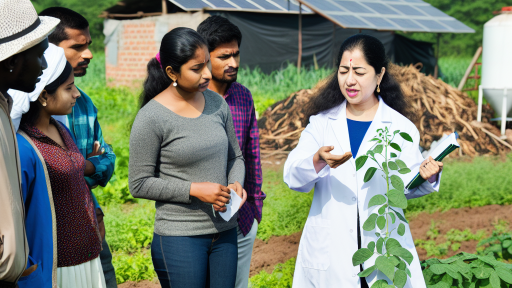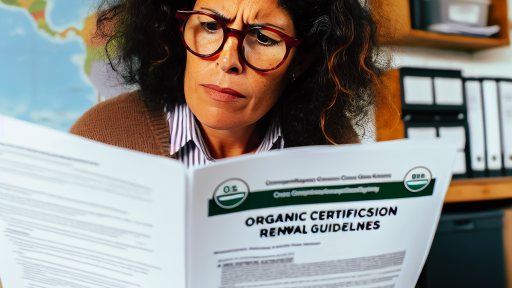Introduction to Organic Certification and Its Importance
Organic certification plays a crucial role in modern agriculture.
It ensures products meet specific organic standards.
This process protects consumers and supports eco-friendly farming.
Farmers benefit from organic certification by accessing premium markets.
Consumers often seek organic products for health and environmental reasons.
Without certification, farmers struggle to prove their practices are organic.
Transitioning to organic methods requires time and investment.
However, the long-term benefits can outweigh initial costs.
Understanding the importance of organic certification is vital for farmers.
It can lead to greater trust and loyalty from consumers.
Moreover, certified farms often experience increased profitability.
Additionally, organic certification can enhance market competitiveness.
Collaborations with organic certifying agencies provide essential guidance.
In essence, certification validates a farmer’s commitment to sustainability.
This commitment resonates with today’s environmentally conscious consumers.
Transform Your Agribusiness
Unlock your farm's potential with expert advice tailored to your needs. Get actionable steps that drive real results.
Get StartedUltimately, organic certification represents a pivotal step towards sustainability.
Understanding the Costs Involved in Organic Certification
Overview of Organic Certification
Organic certification is essential for farmers seeking premium markets.
The process ensures products meet specific organic standards.
It also enhances consumer trust and potentially increases profits.
Initial Costs of Certification
The first step involves application fees paid to certification bodies.
These fees vary based on the scale and type of farming operation.
Farmers also need to consider inspection fees during this phase.
Inspections typically occur annually and can be quite detailed.
Additionally, documentation expenses arise from preparing for certification.
Ongoing Certification Expenses
Ongoing costs maintain the certification status over the years.
Annual renewal fees are required for keeping certification active.
Farmers must also keep up with record-keeping and reporting costs.
These expenses include staff time and possible software subscriptions.
Training and Education Costs
Farmers may need to invest in training for organic practices.
Workshops and seminars are often excellent resources for this purpose.
Education costs help ensure compliance with organic standards.
Costs Associated with Transitioning to Organic Practices
Transitioning from conventional to organic farming incurs additional expenses.
Farmers often face lower yields during the transition period.
Purchasing organic seeds and inputs can also be more costly.
Moreover, many farmers require a comprehensive soil management strategy.
Financial Assistance and Resources
Numerous programs offer financial assistance for organic certification.
Farmers should explore federal and state grants aimed at supporting this transition.
Organizations such as the USDA provide resources and guidance.
Moreover, local agricultural extension offices can be valuable sources of information.
Showcase Your Farming Business
Publish your professional farming services profile on our blog for a one-time fee of $200 and reach a dedicated audience of farmers and agribusiness owners.
Publish Your ProfileLong-term Financial Benefits
Investing in organic certification can yield significant long-term benefits.
Organic products often command higher prices in the marketplace.
Increased demand for organic produce continues to grow steadily.
Additionally, certified organic farms often experience more resilient business models.
Breakdown of Initial Certification Fees for Farmers
Introduction to Certification Costs
Certification fees are a critical aspect for farmers seeking organic status.
Understanding these costs helps farmers plan effectively.
Additionally, it allows them to budget their resources wisely.
Initial Certification Fees Overview
Initial certification fees can vary based on several factors.
The farm size plays a significant role in determining costs.
Furthermore, the type of organic certification influences the fees.
Types of Initial Certification Fees
Farmers encounter various types of fees during the certification process.
- Application fee: This fee covers the initial submission of documents.
- Inspection fee: This is charged for on-site evaluations by certifying agents.
- Organic system plan fee: There may be costs associated with developing this plan.
Factors Affecting Certification Costs
Several factors can impact the overall certification costs.
- Geographic location: Costs may differ based on regional standards.
- Farm complexity: More diversified operations may face higher fees.
- Existing infrastructure: Established farms may incur lower costs.
Additional Costs to Consider
Besides certification fees, farmers should anticipate additional expenses.
Training costs might arise, especially for new organic practices.
Record-keeping systems can also add to the overall expense.
Lastly, marketing organic products may require extra investment.
Financial Assistance Options
Fortunately, financial assistance is available to help farmers with certification costs.
Several organizations provide grants or subsidies for organic farmers.
Additionally, local agricultural departments may offer financial support.
Farmers should explore these resources to alleviate financial burdens.
Uncover the Details: Maximizing Crop Yield Within Water Limits
Annual Renewal Fees and Recurring Costs for Maintained Certification
Understanding Certification Fees
Organic certification requires annual renewal fees.
These fees can vary based on the certifying agent.
Farmers should budget for these recurring costs.
Typically, the fees range from $500 to $2,000 annually.
Some organizations offer sliding scale fees for small farms.
This means smaller operations pay less for certification.
Additional Recurring Costs
Farmers also face additional costs to maintain certification.
These costs include record-keeping and input tracking.
For example, maintaining accurate records of all inputs can be expensive.
Moreover, farmers may need to invest in organic seeds and fertilizers.
Costs for these inputs can significantly impact the budget.
Renewal Process Expenses
The renewal process often comes with its own expenses.
Farmers may need to pay for inspection fees each year.
Inspection fees vary depending on the scale of the operation.
Furthermore, some farms face additional charges for re-inspections.
Being proactive about preparation can help reduce costs.
Investment in Training and Education
Staying certified requires ongoing education and training.
Farmers should invest time and money in workshops and courses.
These resources are critical for understanding organic standards.
Showcase Your Farming Business
Publish your professional farming services profile on our blog for a one-time fee of $200 and reach a dedicated audience of farmers and agribusiness owners.
Publish Your ProfileAdditionally, many certifying bodies offer educational opportunities.
Budgeting for Certification Costs
Organic certification costs can add up quickly for farmers.
Understanding annual fees and recurring costs is essential.
Budgeting effectively can help manage these expenses.
Farmers must plan for both predictable and unforeseen costs.
Staying informed about standards will aid in maintaining certification.
Gain More Insights: Agricultural Trade Policy Best Practices
Additional Costs: Inspections, Testing, and Documentation
Understanding Inspection Costs
Inspections are crucial for obtaining organic certification.
An annual inspection is typically required by certifying agents.
The costs of inspections can vary significantly.
Farmers may pay between $300 and $1,500 per inspection.
Factors influencing costs include farm size and location.
Moreover, the complexity of farming practices can affect fees.
Diving Into Testing Expenses
Testing verifies that products meet organic standards.
Soil, water, and produce may require testing.
Farmers should budget for these necessary evaluations.
Testing costs can accumulate quickly over time.
Generally, testing can range from $50 to $500 per test.
More extensive testing may lead to increased costs.
Documenting Everything
Documentation is a significant aspect of organic farming.
Farmers must keep accurate records of their practices.
These records demonstrate compliance with organic standards.
Documentation includes expenses, labor, and inputs used.
Maintaining organized records can be time-consuming.
However, it’s essential for successful certification renewal.
Additional Considerations for Farmers
Farmers should plan for unexpected costs related to inspections.
Additional documentation may arise from changing regulations.
Furthermore, hiring consultants can add to costs.
Consultants often help navigate the certification process.
Investing in efficient systems can mitigate these costs.
Overall, understanding these expenses aids in better planning.
Discover More: Compliance with Export Regulations
Financial Assistance and Grants Available for Organic Farmers
Overview of Available Financial Support
Organic farmers can access various financial assistance programs.
These programs help reduce the costs of certification and transition.
Additionally, they provide funds for implementing organic practices.
Federal Grants and Programs
The U.S. Department of Agriculture provides significant financial support.
The Organic Certification Cost Share Program offers reimbursement for certification costs.
Farmers can receive up to 50% of their certification expenses, capped at $500.
Moreover, the Environmental Quality Incentives Program supports conservation practices.
These initiatives help farmers adopt sustainable methods effectively.
Showcase Your Farming Business
Publish your professional farming services profile on our blog for a one-time fee of $200 and reach a dedicated audience of farmers and agribusiness owners.
Publish Your ProfileState-Level Assistance
Several states provide unique funding opportunities for organic farmers.
For instance, California has its own Organic Food Program.
This program offers grants for organic certification and educational initiatives.
Farmers should check their state departments for local options.
Farm Credit and Loans
Farmers can explore low-interest loan options from various institutions.
The Farm Service Agency assists in obtaining loans specifically for organics.
These loans help with equipment purchases and farm improvements.
Additionally, nonprofit organizations offer micro-loans for small-scale farmers.
Nonprofits and Private Grants
Numerous nonprofit organizations support organic farming through grants.
For example, the Organic Farming Research Foundation provides funding for research projects.
Similarly, the Sustainable Agriculture Research and Education program offers competitive grants.
Farmers should investigate local nonprofits that focus on agricultural support.
Applying for Financial Assistance
Applying for grants requires thorough preparation and documentation.
Farmers should gather their farm plans and financial statements.
Researching eligibility criteria is crucial for a successful application.
Many organizations offer workshops to help farmers navigate the application process.
Uncover the Details: Water Usage Policies Every Farmer Should Know

Comparative Analysis: Organic vs. Conventional Farming Costs
Overview of Farming Costs
Farming costs play a vital role in agricultural decisions.
Farmers often grapple with the choice between organic and conventional practices.
Understanding cost differences can significantly impact financial outcomes.
Initial Investments in Organic Farming
Organic farming requires higher upfront investments than conventional methods.
Purchasing organic seeds often incurs a premium price.
Additionally, farmers must invest in organic fertilizers and pest control.
Farmers may also need to pay for soil testing and certification.
These initial costs can deter some potential organic farmers.
Annual Operating Costs
Operating costs differ significantly between organic and conventional farming.
Organic farming often entails higher labor expenses due to manual practices.
Moreover, organic farmers face increased costs for certified inputs.
They may also incur costs associated with maintaining certification compliance.
In contrast, conventional farming typically benefits from lower annual expenses.
Certification Costs
Organic certification is a crucial step for compliant farmers.
Costs include application fees, inspection fees, and renewal fees.
These can accumulate, depending on the size of the farm.
Farmers should budget for these recurring costs in their financial planning.
Long-Term Financial Benefits
Organic farming can lead to higher prices for products over time.
Consumers often pay a premium for organic goods.
Additionally, organic practices can enhance soil health and sustainability.
These factors contribute to long-term financial viability for farmers.
Comparative Yield Considerations
Yield differences may influence the financial advantages of each practice.
While organic farms may produce lower yields initially, resilience can develop over time.
Showcase Your Farming Business
Publish your professional farming services profile on our blog for a one-time fee of $200 and reach a dedicated audience of farmers and agribusiness owners.
Publish Your ProfileIn favorable conditions, organic methods can match conventional yields.
Farmers must consider yield expectations when assessing costs.
Market Demand and Pricing
The demand for organic products continues to rise in various markets.
Consequently, organic farmers can benefit from higher price margins.
In areas where demand is low, conventional farming may prevail financially.
Understanding market trends is essential for cost-benefit analysis.
Government Support and Subsidies
Government programs may offer assistance for organic farmers.
Subsidies can offset some certification and operational costs.
Farmers should explore funding opportunities to ease financial burdens.
Such support can make the transition to organic more feasible.
Long-term Benefits of Investment in Organic Certification
Increased Market Demand
Organic products have gained significant consumer interest in recent years.
This demand often translates to higher prices for certified organic products.
Farmers investing in organic certification can tap into this lucrative market.
Moreover, consumers are increasingly willing to pay a premium for organic goods.
Improved Soil Health
Investing in organic practices fosters healthier soils.
Organic farming enhances soil structure and fertility over time.
Healthier soils lead to better crop yields and resilience against pests.
Consequently, farms can reduce the amount of chemical fertilizers needed.
Brand Recognition and Trust
Obtaining organic certification builds trust between farmers and consumers.
Consumers often prefer products from certified organic farms.
This trust can enhance the farm’s brand reputation and loyalty.
As a result, farmers can establish a competitive edge in the market.
Access to New Markets
Certification opens doors to various markets that prioritize organic products.
Farmers can access specialty stores, farmers’ markets, and online platforms.
These new avenues often represent a substantial increase in customer reach.
Additionally, many restaurants and food services seek locally sourced organic goods.
Environmental Sustainability
Investing in organic certification promotes sustainable farming practices.
This approach minimizes negative impacts on the environment.
With organic farming, biodiversity receives protection through various practices.
Moreover, sustainable methods conserve water and reduce pollution risks.
Long-term Financial Stability
While initial costs can be significant, benefits outweigh the expenses over time.
Farmers often find that organic methods lead to lower overall production costs.
Additionally, sustainable practices reduce the need for expensive chemical inputs.
Over the long term, these savings contribute to greater financial stability.
Case Studies: Successful Organic Farmers and Their Certification Journey
Introduction to Successful Organic Farmers
Organic farmers often invest time and resources for certification.
These journeys highlight the challenges and rewards of organic farming.
We will explore the stories of three successful organic farmers.
Maria Gonzalez: A Family-Owned Organic Vegetable Farm
Maria operates a small vegetable farm in California.
Her family transitioned to organic practices fifteen years ago.
Initially, they faced high certification costs and bureaucratic hurdles.
Showcase Your Farming Business
Publish your professional farming services profile on our blog for a one-time fee of $200 and reach a dedicated audience of farmers and agribusiness owners.
Publish Your ProfileHowever, Maria leveraged community resources for guidance.
After receiving certification, sales increased significantly.
Today, her farm supplies local restaurants and farmer’s markets.
Key Takeaways from Maria’s Journey
- Networking with local farmers proved invaluable.
- Investing in education helped navigate the certification process.
- Understanding the market’s demand for organic produce was crucial.
James Thompson: Organic Dairy Farming
James runs an organic dairy farm in Wisconsin.
His journey began when he decided to pursue sustainability.
The certification initially seemed daunting and costly.
He attended workshops organized by the USDA.
These workshops connected him with experienced organic farmers.
James learned about efficient practices that reduced costs.
Today, his products are popular across the Midwest.
Lessons from James’ Experience
- Education and training are vital for successful certification.
- Building a support network can ease challenges.
- Commitment to sustainable practices can lead to financial growth.
Laura Chen: Organic Orchard Development
Laura operates a successful organic orchard in Oregon.
Her passion for sustainable agriculture led her to organic farming.
She faced initial resistance from traditional growers.
Nonetheless, Laura pursued organic certification with determination.
She utilized grants to alleviate some of the financial burden.
Now, her orchard is well-respected in the local community.
Insights from Laura’s Path
- Persistence is essential when facing industry skepticism.
- Funding opportunities can support transition efforts.
- Engaging with the community fosters trust and relationships.
Inspiring Stories of Organic Farmers
These farmers illustrate the potential of organic farming.
With dedication and the right resources, certification can be achieved.
The stories of Maria, James, and Laura inspire future organic farmers.
Additional Resources
US Farm Policy: USDA-Certified Organic Production | CRS Reports
Becoming a Certified Operation | Agricultural Marketing Service




